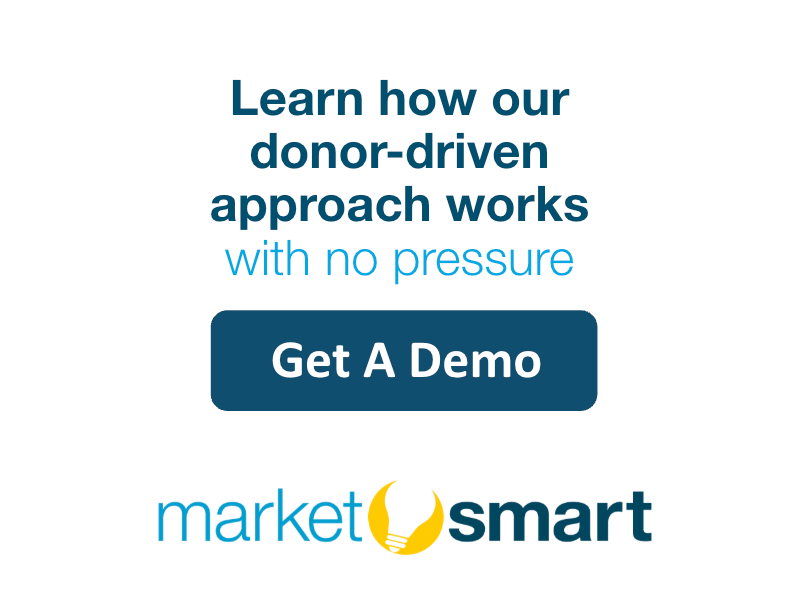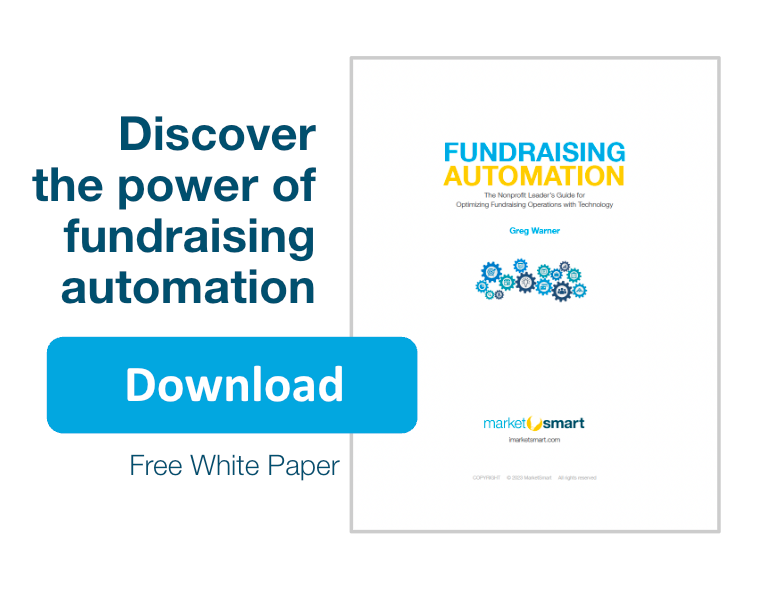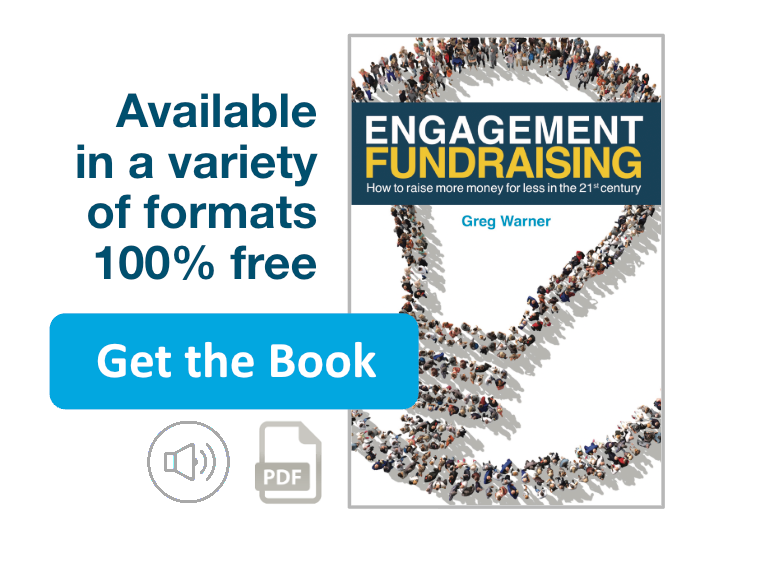 You are not a fundraiser. You are, instead, an engagement facilitator. Tweet this!
You are not a fundraiser. You are, instead, an engagement facilitator. Tweet this!
And, the purpose of your engagements with donors is to discover why they give; what would inspire and motivate them to give; and, how you can help them to give.
Let’s face it, people give for a variety of reasons. But they rarely think deeply about them. And why should they? It’s not in the donor’s best interest to sit down and analyze why they give. But it IS in yours. Tweet this!
That’s why you should survey and interview your donors frequently when you engage with them. Ask questions. Listen carefully to help them discover why they might want to give. Then, be sure to reflect those reasons in your future engagements and marketing communications.
It’s really quite simple. So don’t bother making it more complex.
1. Engage – reach out with valuable offers that your donors will appreciate
2. Discover – ask questions to help you both uncover why your donors give
3. Reflect – evoke those reasons every time you communicate with your donor





Spot on!
Greg, you are 100% right. Many fundraisers forget the, “Friend-raise BEFORE Fund-raise” motto.
HOW you communicate
WHAT you communicate
WHEN you communicate
WHERE you communicate
WILL determine how your donor will involve themselves in your organisation
Greg,
This is right on! I see this with large universities where the development officer assumes alumni will give. And don’t have this type of conversation. Super essential it happen.
Thanks everyone. Sometimes, when I “take the gloves off”… I’m never sure if I’m going to upset people or make them happy. I’m glad you liked that post!
Great read. I like that you kept it simple, Greg. When I’m delivering training or coaching sessions I remind people that communication has two parts to it: Talking AND Listening. Finding ways to listen & participating in two-sided conversations is key to engagement, don’t you agree? But that means putting the time in with key supporters to actively seek out ways to listen.
Thanks Lori. By the way, I love your title: Chief Fundraising Culture Changer & Master Storyteller
Thanks so much Kelley. You are absolutely right. You don’t ask… you don’t get!
Thanks Robin. I’m glad the title got you interested and the article got you hooked.
That is great statement, which has been disturbing me all the time. Even I came to think that raising funds is begging. sometime I think what do people think about me standard in front of them and making them to be involved in the work.
Thanks John. You can’t ask for money until you know the person. Therefore, you must engage first. Find out why they want to give. THEN the “ask” will happen naturally. It’s not begging… it’s facilitating the transaction by evoking the right emotions and providing opportunities for people to make a difference.
[…] Your Job is NOT to Raise Funds. I was lucky enough to work with an executive director who introduced me to folks as “director of […]
Interesting article, Greg. I am very new to managing a nonprofit (we opened in June) and have been learning the ins and outs diligently. I would love to see some sample questions that you could use to engage donors and prospective donors. Our ministry works with equipping young single mothers to break out of poverty, lack of education and welfare dependency.
I often find myself getting so caught up in the need, the various levels on which these women need assistance – physical, emotional, relational, spiritual, etc. that I indavertantly overwhelm my prospect with the “big-ness” of the need.
How would you suggest I survey their interests and draw more on their own intrinsic reasons for support?
Hi Suzanne-
This is a very big question that can’t really be answered in a short response on my blog. Bottom line: you should continuously survey your supporters. Ask them:
-why they care?
-did someone inspire them to care?
-how important is this to them (scale of 1 to 5 for instance)?
-how would they be willing to help? what kind of assistance interests them?
This can be done with simple inserts piggy-backed with a “thank you” letter or tax deduction receipt… or as a standalone mailing effort.
And, last thing… always leave room for “comments” by saying, “Is there anything else you would like to tell us?” That little spot will get you the most wonderful responses.
Just do it! Don’t wait. Then you’ll learn how to tweak the questions as you move forward to get the best result.
Best of luck!
[…] bet that headline made you look again. That’s exactly the idea that this great blog post challenges all development staff and volunteers to consider. So what is your job about, […]
Wonderful post Greg, and very insightful questions and responses. Thanks everyone.
One question I have, what do you have in mind when you say “valuable offer your donors will appreciate”?
I’d love to hear some examples. Thanks!
This might require a personal conversation Judie (so I can SHOW you instead of tell you).
Here are just a few:
A simple link to a Donate Now button (that’s an easy one)
A Donor Advised Fund link (widget) so they can give from their DAF instantly
Reports such as information about other ways to donate (for example, stocks or real estate)
Friend-to-friend sharing/involvement links/widgets/tools
Opportunities to sign-up for e-alerts, e-newsletters, subscriptions, volunteering, leadership committee roles, etc.
Links to other appropriate/relevant resources that would provide value to the donor engagement experience such as:
eBooks/checklists/downloads
Links to snappy Infographics
Links to meaningful and relevant videos
Opportunities to sign up for Insider Bulletins or Blog Posts and News Articles
Opportunities to take a donor survey
I could go on and on. The list could be endless…..
Excellent! !! Thank you for the insight!
yep…however, as you’ve said before, Greg, let’s face it….you’re in sales! but sales also means you need to engage, then discover…and reflect/communicate on how to make the sale win/win for the customer… ! thanks, as usual…
Thanks everyone. Sometimes, when I “take the gloves off”… I’m never sure if I’m going to upset people or make them happy. I’m glad you liked that post!
Excellent points and ideas Greg- I coudln’t agree more! However, I it is also important to support the comments already stated about the idea that it STILL does eventually have to come down to- you have to ask! No matter what form or preparation or relationship building you do. I have found that to often “Fund raisers” will quickly latch on to the “Friend raiser” idea in order to escape or avoid the discomfort that we ARE in the busines of getting to the ask.
Naturally, it is much easier to “make friends” than it is to raise money. But we must change our perspective from begging and cajoling to providing an opportunity for someone to help and join us to meet the mission and passion. But as Zig Ziglar is quoted as saying, “If you see a sales person who doesn’t ask, you are looking at a hungry person!”
Thanks so much Kelley. You are absolutely right. You don’t ask… you don’t get!
When I first saw this I was a bit put off by the title. I’ve always believed that no matter what you do for a Non-Profit it is your job to raise funds. At times this was disapproved of by the Development Department since I was in Marketing.
As I read the article, I was hooked. Greg treated raising money as a Sales Person. Something many more organizations can do. And he’s spot on when he says “it’s not all about the money”. I’ve given my time to various non-profits more than money. When they use your ideas for a successful fundraiser you are much more valuable than a cash donation.
Great read. I look forward to more.
Thanks Robin. I’m glad the title got you interested and the article got you hooked.
[…] Your Job is NOT to Raise Funds. I was lucky enough to work with an executive director who introduced me to folks as “director of […]
Wonderful post Greg, and very insightful questions and responses. Thanks everyone.
One question I have, what do you have in mind when you say “valuable offer your donors will appreciate”?
I’d love to hear some examples. Thanks!
This might require a personal conversation Judie (so I can SHOW you instead of tell you).
Here are just a few:
A simple link to a Donate Now button (that’s an easy one)
A Donor Advised Fund link (widget) so they can give from their DAF instantly
Reports such as information about other ways to donate (for example, stocks or real estate)
Friend-to-friend sharing/involvement links/widgets/tools
Opportunities to sign-up for e-alerts, e-newsletters, subscriptions, volunteering, leadership committee roles, etc.
Links to other appropriate/relevant resources that would provide value to the donor engagement experience such as:
eBooks/checklists/downloads
Links to snappy Infographics
Links to meaningful and relevant videos
Opportunities to sign up for Insider Bulletins or Blog Posts and News Articles
Opportunities to take a donor survey
I could go on and on. The list could be endless…..